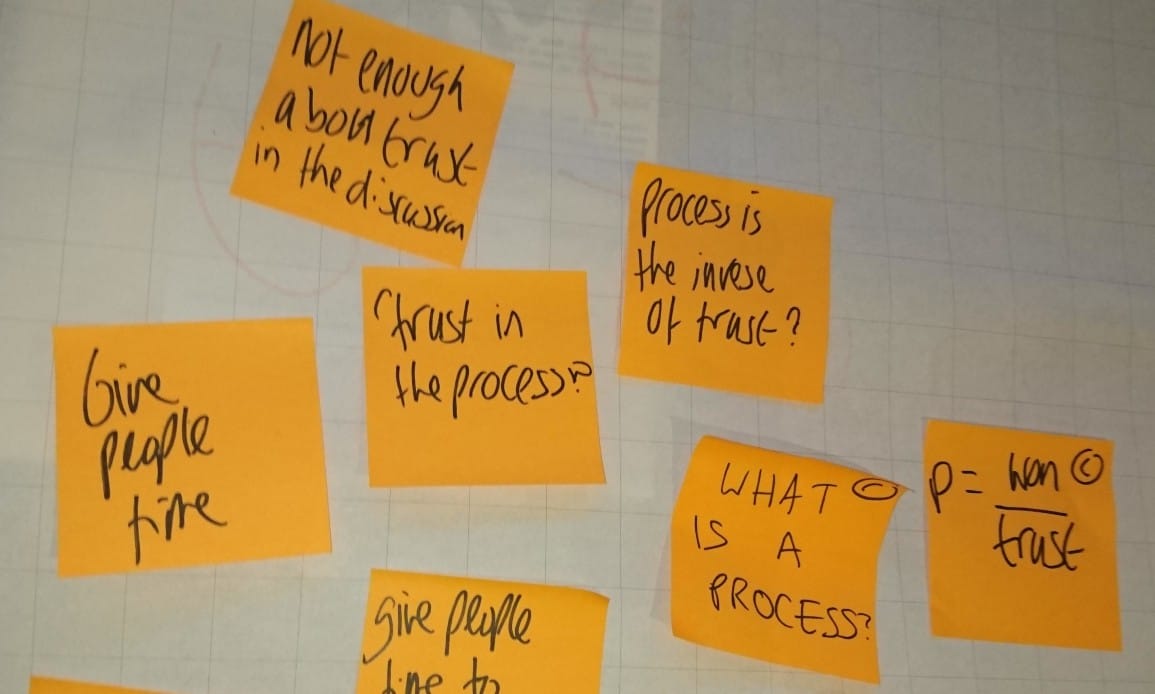One drop of trust at a time

(Originally published June 2017).
When I wrote ‘my quietly loud declaration’ I said I wanted to help create a positive and supportive environment. An environment where loud and quiet voices can speak and be heard. I’ve also previously outlined some techniques which work for me. But it’s not that simple.
Techniques for creating time and opportunity for those voices aren’t enough. Providing quiet work areas or a post-it based meeting isn’t the all-that either. Lots of those things are artefacts or processes — don’t human beings need more than that?
At the last Agile Sheffield meet up we spent time chatting about the first Agile Manifesto value. (Update: I'm no longer involved in agile Sheffield).

We ran out of time and, whilst we did discuss ‘process is the inverse of trust’ (thanks to @ShaneBluemel) one key point was that we didn’t focus enough on trust.
I’ve reflected on this since the meet-up. I can build trust by making and keeping commitments. I can build trust by keeping those commitments whilst aiming to be open, inclusive and looking after the interests of others. Is that it?
I recently read ‘Reasons to stay alive’ by Matt Haig*. (It’s not one of those self-help books which result in guilt trips ‘cos you never complete the exercises at the end of each chapter or you feel worse as the advice doesn’t works for you. Just me?).
Matt writes that, ‘a drop of ink falls into a clear glass of water and clouds the whole thing’. He’s writing about his mental health and the pervasive nature of doubt which can quickly move into hopelessness.
That drop of ink can also be trust.
The smallest or simplest things can result in potentially surprising increases in trust and openness developing with others. I’ve shared that I often feel like I’ve got the impostor syndrome (yeah, I agree syndrome is a bit strong but Google it to see if you can relate) and have been amazed at how many people have later told me they can relate to this and it makes them feel better and potentially more confident to challenge themselves to do more.
I’ve shared that I can find it challenging in busy and noisy social or work settings. However, I’ve trained myself so much that I frequently enjoy them now and use my experiences to support others who may feel the same way. I’ve spoken to people who can relate to this and don’t feel they are the only ones with a ‘social pot’ which can easily be drained.
I’ll also share that I read Matt’s book as I can relate to some of his experiences.
What else can people do to build trust?
Don’t aim for grand gestures or push yourself too hard. This isn’t about thinking you have to share every secret or vulnerability. This isn’t about you needing to know everything about people you work with nor expecting the same in return. It’s about having the confidence to say you’re human and as imperfect as the next person and helping others say the same.
And as Matt also wrote, ‘sip, don’t gulp’ — one drop of trust at a time.
P.S. I struggled writing this. I’m unsure if it’s ready to be published but figured as I’m writing about imperfection — this shouldn’t matter too much...
*With acknowledgements to Matt Haig and ‘Reasons to stay alive’, (2015). 2023 me has read more widely since then.